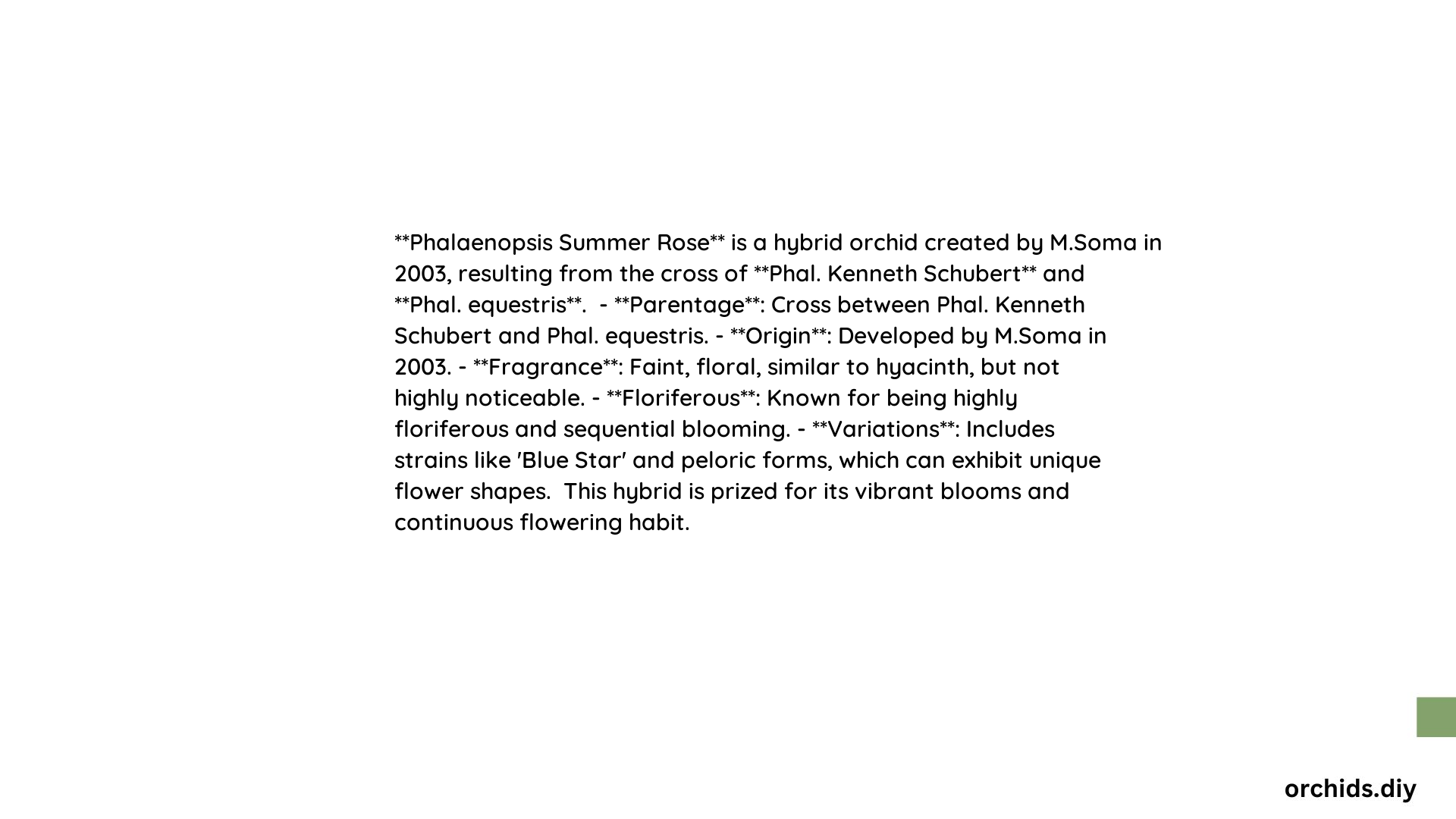Phalaenopsis Summer Rose is a stunning variety of moth orchid known for its vibrant pink blooms and ease of care. This popular hybrid combines the beauty of traditional Phalaenopsis with enhanced color intensity and bloom longevity. Summer Rose thrives in bright, indirect light and moderate humidity, making it an ideal choice for both novice and experienced orchid enthusiasts. With proper care, this orchid can produce spectacular floral displays for several months each year.
What are the Key Characteristics of Phalaenopsis Summer Rose?
Phalaenopsis Summer Rose stands out among moth orchids for several reasons:
- Flower Color: Deep pink to rose-colored blooms
- Bloom Size: Large, up to 4 inches in diameter
- Fragrance: Mild, sweet scent
- Foliage: Dark green, glossy leaves
- Growth Habit: Compact, suitable for small spaces
How to Provide Optimal Light Conditions for Summer Rose?

Proper lighting is crucial for the health and blooming of Phalaenopsis Summer Rose:
- Ideal Location: East or west-facing windows
- Light Intensity: Bright, indirect light (1000-1500 foot-candles)
- Duration: 11-14 hours daily, depending on the season
- Protection: Avoid direct sunlight, especially during midday
To ensure your Summer Rose receives adequate light without risking damage:
- Use sheer curtains to filter strong sunlight
- Rotate the plant regularly for even growth
- Consider artificial grow lights for low-light environments
What are the Temperature and Humidity Requirements?
Summer Rose thrives in specific temperature and humidity ranges:
| Condition | Daytime | Nighttime |
|---|---|---|
| Temperature | 70-80°F (21-27°C) | 60-65°F (16-18°C) |
| Humidity | 50-70% | 50-70% |
To maintain ideal conditions:
- Use a humidity tray or room humidifier
- Avoid placing the orchid near heating or cooling vents
- Provide adequate air circulation to prevent fungal issues
How Often Should You Water Phalaenopsis Summer Rose?
Proper watering is essential for Summer Rose’s health:
- Frequency: Once or twice a week, depending on environmental conditions
- Method: Water thoroughly, allowing excess to drain completely
- Timing: Water in the morning to allow leaves to dry before nightfall
Signs of improper watering:
- Overwatering: Yellow leaves, root rot
- Underwatering: Wrinkled leaves, slow growth
What is the Best Potting Medium for Summer Rose?
Choose a well-draining potting mix specifically designed for orchids:
- Recommended Mix: 60% bark, 15% perlite, 15% charcoal, 10% sphagnum moss
- Alternative: New Zealand Sphagnum Moss
Repotting guidelines:
- Repot every 1-2 years or when the medium breaks down
- Use a pot with drainage holes, preferably clear plastic
- Ensure the crown of the plant sits above the potting medium
How to Fertilize Phalaenopsis Summer Rose?
Regular fertilization promotes healthy growth and abundant blooms:
- Frequency: Weekly during growing season, monthly during dormancy
- Type: Balanced, water-soluble orchid fertilizer (20-20-20)
- Strength: Use at 1/4 to 1/2 the recommended strength
- Method: “Weekly weakly” – fertilize lightly but frequently
What are Common Pests and Diseases Affecting Summer Rose?
Be vigilant for these common issues:
- Mealybugs: White, cottony insects on leaves and stems
- Spider Mites: Tiny red or brown specks, often with webbing
- Root Rot: Soft, brown roots caused by overwatering
Prevention and treatment:
- Inspect plants regularly
- Isolate affected plants immediately
- Use neem oil or insecticidal soap for pest control
- Adjust watering practices to prevent root rot
How to Encourage Reblooming in Phalaenopsis Summer Rose?
To promote repeat blooming:
- Provide a temperature drop of 10-15°F at night for several weeks
- Maintain consistent care routine
- Cut spent flower spikes just above the second node from the base
- Ensure adequate light and nutrition
What are the Best Display Options for Summer Rose?
Showcase your Phalaenopsis Summer Rose:
- Decorative ceramic pots with proper drainage
- Hanging baskets for cascading effect
- Terrariums with proper ventilation
- Group displays with other orchids or tropical plants
Remember to prioritize the plant’s care needs over aesthetics when choosing a display method.
References:
